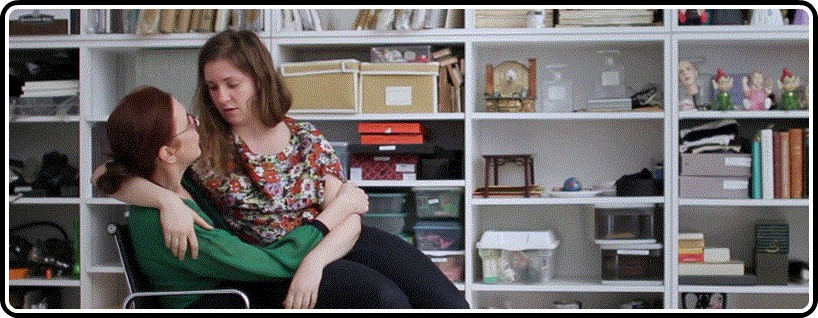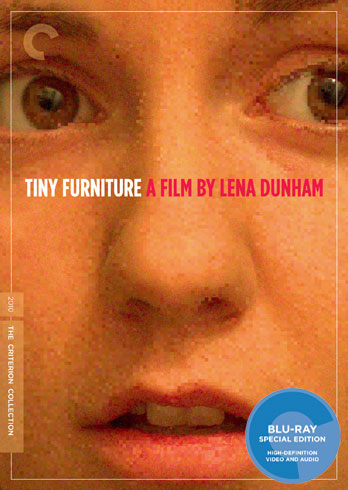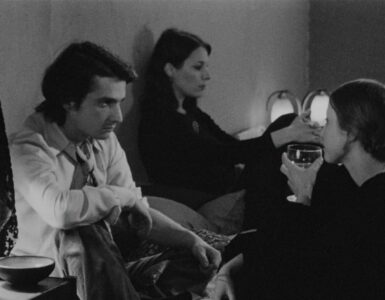
As rumors began to accumulate over the last half of 2011 that Lena Dunham’s Tiny Furniture was heading for inclusion in the Criterion Collection, I was initially oblivious to the controversy that the film would generate. I’d heard a little bit about the film from various sources, including Ryan’s early review on this site, after it had won a jury award in the 2010 SXSW film competition, but hadn’t paid too much attention since Tiny Furniture had never screened in my part of the country (that I knew about, anyway.) And it wasn’t a film that particularly captured my attention either – a low budget indie flick made by a new 20-something director speaking primarily to members of her own generation is all fine and well, but with all the great movies I have yet to see and limited time to commit to that pursuit, I wouldn’t have put Tiny Furniture all that high on my list of cinematic priorities in any case.
But once those rumors were confirmed, my interest was piqued by the spectacular backlash that news generated among many viewers more familiar than I am with the contemporary indie scene. Usually, the most negative responses I see in the aftermath of a Criterion new release announcement are either sneering dismissal because they’ve chosen some kind of commercial Hollywood movie (e.g. Broadcast News or, more recently, Being John Malkovich) or smug indifference because the title just doesn’t cause sufficient excitement to warrant a future purchase. But I detected an unusual degree of vitriol in the tear-down comments directed at Tiny Furniture, and even more specifically at its director Lena Dunham. What was that all about, I wondered. Jealousy? Banal sexism? Was there something that she said or did in her social scene to provoke such scorn? I had a hard time imagining what it could have been – a lot of directors behave like obnoxious pricks without impugning their films’ reputations, and in some cases, their rudeness only enhances the legend. Clearly something was gnawing away at a portion of Dunham’s audience, and I had a morbid curiosity to see for myself just what it was that led them to become so unhinged.
So earlier this month, when Tiny Furniture finally saw the light of day on DVD and Blu-ray, I specifically requested this assignment to review it for Criterion Cast. With my usual focus on older films and Criterion’s back catalog, I don’t always take much time to review newer films (though I have done more of that recently.) I was eager to take on a new challenge and see what the movie-making kids are up to these days. What I discovered was pretty close to what I expected to find – a chatty, meandering and incessantly self-referential string of episodic incidents that’s clearly not going to appeal to the full range of cinephiles who consider themselves Criterion fans. But to me, what saved the film from collapsing into a flimsy heap of hipper-than-thou narcissism and self-conscious cuteness is its depth of insight into its main characters, even when those personalities are most notable in terms of their shallowness and triviality. At this point, I’ll assume most people reading this understand that the story involves a brief period in the life of a young woman who’s just graduated from college with a degree in writing, no solid job leads or even practical work skills and is returning home to figure out her next move. She happens to live in a super-fashionable apartment in an expensive part of Manhattan, and the hook here is that Dunham cast her mom and sister to play the same roles in the film, even shooting the domestic scenes in her real-life dwelling. Though the budget was very small, it looks great, primarily due to excellent cinematography by Jody Lee Lipes, and let’s not undervalue the role that Tiny Furniture‘s splendid images played in warranting a Criterion release.
Though my first take on the film was to fall into the conventional verdict of its “quirkiness,” a couple more viewings and additional pondering led me to conclude that it wasn’t nearly as “quirky” (whatever that word actually signifies) as I had originally assumed, when compared to any number of other films or TV shows that clobber us more relentlessly with the latest in hipster slang, fashion and eccentric behavior. Certainly there are touches of all that, and I’m sure that Tiny Furniture will function as an effective time capsule of its era when we look back on it five or ten years from now. More importantly though, Dunham’s sharply attuned ear and writing captures verbal exchanges that reveal the timeless, underlying humanity of the souls who drift across her oh-so-contemporary canvas. The young people at the center of Tiny Furniture‘s narrative are still rather unformed, even though the intensity of their lives has already made them pretty complicated individuals, especially as they grapple with an inescapable awareness of the essential absurdity of their own desires and ambitions. In both Tiny Furniture and its predecessor, Dunham’s first full-length feature Creative Nonfiction (also included in this package,) an axiom seems to govern the action, in which the higher one’s capacity for reflective thinking and self-evaluation, the more difficult it becomes to act out whatever impulses one would like to mindlessly follow at any given moment.
Despite what seems to me like a remarkably capable and impressive demonstration of film-making and scripting skills at an early age, Lena Dunham still has many detractors, so let me return for a moment back to that topic. In a brief video essay included as a supplemental feature for Tiny Furniture, screenwriter Paul Schrader made many of the same points that occurred to me after I watched the movie and thought about it for awhile, as to why some people remain incredulous about the amount of attention, critical praise and (let’s get real now) financial compensation, not to mention open doors of opportunity, that Lena Dunham has enjoyed since her film broke away from the pack. Schrader sums it up in one pithy phrase, “why her, why not me?” It’s a feeling I can relate to from other phases of life, and I challenge anyone who still feels especially contemptuous of Dunham’s success to do a bit of honest internal evaluation to see if anything resembling envy is driving them to that assessment. Sure, it is easy to brush her off for following formulas that Woody Allen, Jerry Seinfeld, Wes Anderson, Kevin Smith and many others first established and perfected in their own ways, but none of them were completely original in their respective debuts either. And regardless of whatever grudges some may harbor against Dunham for earning more acclamation than they think she deserves, the truth is that now the bar is set even higher for her, and the pressure is on to deliver something worthy of all the hype. I can’t help but wonder if those taking potshots at her or her film are really ready to take up the challenge of scripting, directing and acting in a series on HBO, as Dunham is currently working on. Or even one of those tasks, on a professional level, for that matter.
As much as I enjoyed my experience of watching Tiny Furniture (though not without some seriously mixed emotions of lament for people whose lives so closely resemble that script’s passages of despair, addiction and disillusionment,) what seals the deal for me in making it a thoroughly deserving entry into the Criterion Collection is the compact overview it provides through the supplements, capturing Lena Dunham’s apprentice works for posterity. And that much-maligned cover, a hyper-close-up of Dunham’s homely face looking pretty vacant and even kind of snot-nosed due to excessive pixelation, seems oddly appropriate to me now, given her penchant for blatantly self-denigrating humor. Dunham is clearly developing a persona that will serve as her calling card for the foreseeable future in whatever acting projects come her way.
Time will have to tell, of course, whether or not she goes on to secure a place among her generation’s definitive cinematic voices, but the path she’s traced, through self-produced shorts that debuted on YouTube and up through today’s independent film festival circuit, is clearly emblematic of truly independent films in this era, a decade into the new millennium. She captures quite exquisitely the dilemmas faced by a subset of young adults just coming into their own after being raised in a bubble of enhanced media awareness and protective parental oversight that was nevertheless pierced by notable gaps in the layers of protection they sought to wrap around their kids. The insecurities of a post-9/11 world and all the predatory dangers posed (in adults’ minds, anyway) by unfettered access to the internet created an atmosphere of peculiar indulgence on the part of many parents, who sought to raise their kids with an odd mix of guarded innocence and attentively chaperoned experience. Even though Tiny Furniture focuses on a very exclusive, even rarefied microcosm of the emerging Generation Y coming into adulthood, Lena Dunham strikes some universal notes that those of us from more humdrum sectors of American suburbia can easily relate to.
The basis of my authority in saying this is as the father of a daughter who moved back home a few years ago after graduating from college with an art major (BFA with an emphasis on Illustration.) So I have real-life familiarity with the film’s central theme (even though Aura didn’t have her dad around and I’m happy/relieved to say that my daughter’s adjustment to post-grad life was a lot less emotionally tumultuous and risky.) The flipside to all that is my general lack of familiarity with Ms. Dunham’s peers and competition within the mumblecore/indie/DIY scene of recent years, so I have no way to tell if she’s truly the best of the best in this new generation, as her early success would seem to indicate. But what I do see is a woman of substantial intelligence and talent who’s combined her gifts with a ready knack for taking full advantage of her connections.
Born and raised in a rather privileged social milieu of artists based in New York City, Lena Dunham has the good fortune of being able to tell her autobiographically-based story in a setting that is already quite familiar and indisputably interesting to a sizable audience. Let’s face it, a lot of people just love to watch stories set in Manhattan; even a list strictly limited to Criterion films based there would be too long to include in this article. So she has that going for her, and the fact that Criterion’s Park Avenue business office itself is so comfortably nestled in that same locale, mere blocks away from Tiny Furniture‘s TriBeCa neighborhood, gives an impression of inevitability, at least in hindsight, that the film and the imprint would be a natural fit for each other. For the moment at least, Dunham’s move into commercial TV production gives the impression that this may be her only Criterion disc, but if it turns out that way, what a trophy accomplishment to have secured before reaching one’s 25th birthday! Her interview with Nora Ephron in the special features indicates to me that she’s still pretty amazed at how all the pieces fell together for her, the results easily outpacing what she thought were her own realistic goals. It doesn’t appear that success has gone to her head or turned her into an egomaniac. She’s just cool with it, eager to get on to her next project, and as a matter of fact, so am I. Way to go, Lena – keep up the good work. I’ll be watching.







![Bergman Island (The Criterion Collection) [Blu-ray]](https://criterioncast.com/wp-content/uploads/2022/11/bergman-island-the-criterion-collection-blu-ray-400x496.jpg)
![This Is Not a Burial, It’s a Resurrection (The Criterion Collection) [Blu-ray]](https://criterioncast.com/wp-content/uploads/2022/11/this-is-not-a-burial-its-a-resurrection-the-criterion-collection-blu-ray-400x496.jpg)
![Lars von Trier's Europe Trilogy (The Criterion Collection) [The Element of Crime/Epidemic/Europa] [Blu-ray]](https://criterioncast.com/wp-content/uploads/2022/11/lars-von-triers-europe-trilogy-the-criterion-collection-the-element-of-400x496.jpg)
![Imitation of Life (The Criterion Collection) [Blu-ray]](https://criterioncast.com/wp-content/uploads/2022/11/imitation-of-life-the-criterion-collection-blu-ray-400x496.jpg)
![The Adventures of Baron Munchausen (The Criterion Collection) [4K UHD]](https://criterioncast.com/wp-content/uploads/2022/11/the-adventures-of-baron-munchausen-the-criterion-collection-4k-uhd-400x496.jpg)
![Cooley High [Criterion Collection] [Blu-ray] [1975]](https://criterioncast.com/wp-content/uploads/2022/11/cooley-high-criterion-collection-blu-ray-1975-400x496.jpg)